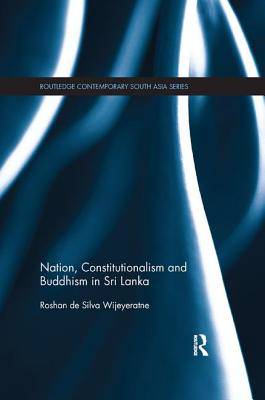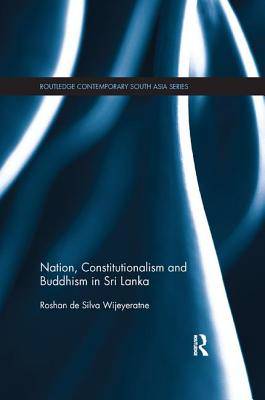
- Retrait gratuit dans votre magasin Club
- 7.000.000 titres dans notre catalogue
- Payer en toute sécurité
- Toujours un magasin près de chez vous
- Retrait gratuit dans votre magasin Club
- 7.000.0000 titres dans notre catalogue
- Payer en toute sécurité
- Toujours un magasin près de chez vous
Nation, Constitutionalism and Buddhism in Sri Lanka
Roshan de Silva WijeyeratneDescription
Nation, Constitutionalism and Buddhism in Sri Lanka offers a new perspective on contemporary debates about Sinhalese Buddhist nationalism in Sri Lanka. In this book de Silva Wijeyeratne argues forcefully that 'Sinhalese Buddhism' in the period prior to its engagement with the British colonial State signified a relatively unbounded (although at times boundary forming) set of practices that facilitated both the inclusion and exclusion of non-'Buddhist' concepts and people within a particular cosmological frame. Juxtaposing the premodern against the backdrop of colonial modernity, de Silva Wijeyeratne tells us that in contrast modern 'Sinhalese Buddhism/nationalism' is a much more reified and bounded concept, one imagined through a 19th century epistemology whose purpose was not so much inclusion, but a much more radical exclusion of non-'Buddhist' ideas and people.
In this insightful analysis modern Sinhalese Buddhist nationalism, then, emerges through the conjunction of discourse, power and knowledge at a distinct moment in the trajectory of the colonial State. An intrinsic feature of this modernist moment is that premodern categories (such as the cosmic order) were subject to a bureaucratic re-valuation that generated profound consequences for State-society relations and the wider constitutional/legal imaginary. This book goes onto explore how key constitutional and nation-building moments were framed within the cultural milieu of modern Sinhalese Buddhist nationalism - a nationalism that reveals the power of a re-valued Buddhist cosmic order to still inform the present.
Given the intensification of the Sinhalese Buddhist nationalist project following the defeat of the Tamil Tigers in 2009, this book is of interest to scholars of nationalism, South Asian studies, the anthropology of ritual, and comparative legal history.
Spécifications
Parties prenantes
- Auteur(s) :
- Editeur:
Contenu
- Nombre de pages :
- 256
- Langue:
- Anglais
- Collection :
Caractéristiques
- EAN:
- 9781138575547
- Date de parution :
- 12-10-17
- Format:
- Livre broché
- Format numérique:
- Trade paperback (VS)
- Dimensions :
- 156 mm x 233 mm
- Poids :
- 452 g

Les avis
Nous publions uniquement les avis qui respectent les conditions requises. Consultez nos conditions pour les avis.






